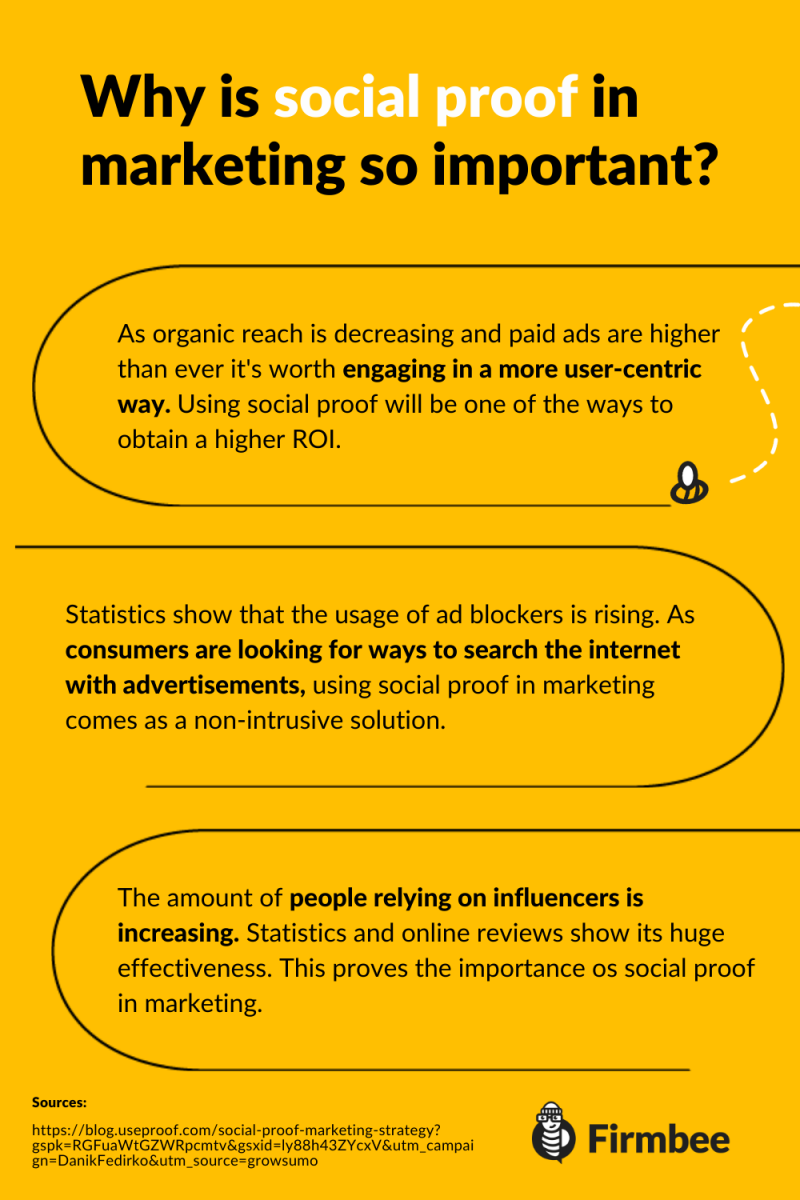Robert Cialdini, a renowned psychologist and author of Influence: Science and Practice, has shown that people who make uncertain choices are much more likely to be influenced by the experiences and opinions of others. How do you use social proof in marketing? Learn more about this phenomenon and see how to increase your sales with it.
The strength of social influence
By definition, social influence is the influence of the environment, as a result of which a person changes his or her attitude in the cognitive, emotional, or behavioral sphere.
One of the psychological principles of social influence is the principle of social proof. We all use it, often unconsciously, e.g. when making choices in the sphere of buying particular goods, choosing the best hotel, or taking advantage of the services of a particular restaurant.
This phenomenon is also the basis of so-called social proof in marketing.
Why is social proof in marketing so important?
On useproof.com you can find high-quality evidence on why is social proof in marketing so important, especially now. It’s also worth mentioning that this tool itself is a great way to incorporate social proof elements into your website.
source: https://blog.useproof.com/social-proof-marketing-strategy?gspk=RGFuaWtGZWRpcmtv&gsxid=ly88h43ZYcxV&utm_campaign=DanikFedirko&utm_source=growsumo

Social proof: three psychological aspects
Social proof in marketing is nothing else than deciding on a particular choice of service/product based on the opinions of people who have some experience in the matter.
This means that we are much more likely to make a particular choice if it is approved by the majority (if everyone does it, why can’t I?).
The second aspect of social proof in marketing concerns the opinion of authority. Often well-known, popular people are involved in advertisements, in which they present the positive features of a product or service. Using the image of a famous person strengthens the belief that the advertised thing is credible, profitable and worth buying (after all, the authority cannot be wrong).
The third point is the feedback aspect: even if a product is recommended by barely a handful of people, we’ll choose it more readily than a product with no feedback (someone tried it, so I can trust them).
Experiment 1: Choice of mineral water
How can social proof be put into practice? Imagine the most ordinary bottled mineral water. On the shop shelf there is a range of almost identical products, differing only in their labels. We do not care about the specific qualities of the product: our goal is simply to quench our thirst. The price of the products is similar to each other, and in many cases – the same. When making a choice we will be guided by our experiences and the popularity of a given brand. The decision will depend on the ads we have seen, opinions we have read on the Internet, as well as purchase decisions of other people present in the store (we are more likely to reach for water that someone else has already put in the basket). In this way, we reject other competing products, even though they may not be worse.Experiment 2: Buying a smartphone online
An even clearer example of the impact of social proof marketing is online shopping. This is because the consumer does not have to deal with distracting stimuli that could affect his choice (in a store, he or she may reach for a product that is closer to the shelf or has more aesthetic packaging). Buying online is primarily related to financial issues and recommendations. It is the opinions of previous customers that will convince us to buy a smartphone from a particular electronic store. If two identical smartphones are sold for the same price, we are much more likely to choose the product that has reviews and ratings given by Internet users.How to apply social proof in e-commerce?
Knowing the mechanisms of social proof can be an effective way to increase sales in your own online store.
Cialdini puts it clearly: when many people do something, it is the right thing to do.
The more opportunities to create personalized opinions, the more people can be persuaded to use the assortment presented on our website. Let’s allow our consumers to freely express their opinions about purchased products or services. For this purpose, there are not only panels that enable rating on different scales, but also text boxes that encourage internet users to add their own feedback.
In most cases, we will not have a direct influence on the content of the comments (deleting unfavorable ones will be considered unfair).
However, we can efficiently encourage customers to post positive or neutral opinions:
- Ask about neutral things (Was the size right? Was the packaging undamaged?)
- Keep the question style loose (Hey! Share your opinion!).
- Avoid questions about things beyond your control (How would you rate the courier?)
- Give the opportunity to voice negative issues (What could we improve? What are the downsides of the product?)
- Encourage feedback by showing real profit (Leave feedback to get a discount!)
Do you like our content? Join our Facebook community to stay in touch!
Author: Zofia Lipska
With over 10 years of experience in digital marketing, Sophia not only knows the rules of this industry but above all knows how to break them in order to achieve outstanding and creative results.


















